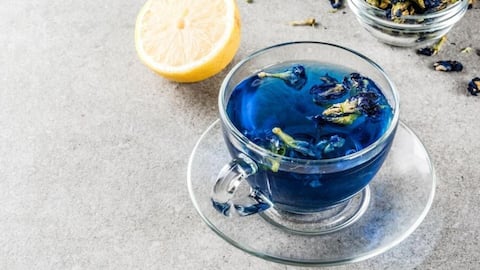Blue tea: What is it and how is it healthy
What's the story
Blue tea is a beverage made from the flowers of the Clitoria ternatea plant which has a strong blue color. This Southeast Asian native shrub is also known by the common names butterfly pea, Kordofan pea, blue pea, aparajita, and Asian pigeonwings. Due to its amazing health benefits, it has become a popular food trend in recent years. Let's check out its health benefits.
Benefit 1
Good for digestion
As blue tea is high in antioxidant content, it is an excellent addition to any detox diet, particularly during the summer season. Having a cup of blue tea on an empty stomach once or twice a week helps significantly improve digestive health by flushing out toxins that have accumulated in the system. This can help you steer clear of constipation and bloating.
Benefit 2
Helps with weight loss
Not only does blue tea have no caffeine, but it also has no carbohydrates, fats, or cholesterol, which makes it an ideal choice for weight watchers and those looking to lose a few extra pounds. Moreover, this beverage is an amazing herbal concoction for preserving ideal body weight because it suppresses appetites for junk food at the wrong time.
Benefit 3
Improves hair health
Given that anthocyanin, a substance found in blue pea flowers, is known to promote blood circulation in the head and thus maintain a healthy scalp, this tea is incredible for your hair's health. Moreover, it supports the internal strengthening of the hair follicles, ensuring issues like hair fall remain at bay. Thanks to its antioxidant content, it also aids in dealing with hair loss.
Benefit 4
Enhances skin health
The flavonoids in blue tea aid in the development and maintenance of skin elasticity by stimulating the production of collagen. This helps in retaining the natural glow of your skin and keeps you away from acne formation. As you drink it daily, the body is internally cleansed and dull skin is greatly brightened, with dark spots and uneven skin tone eliminated.
